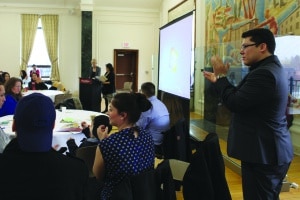Mount Allison’s second indigenous conference was hosted over two days, March 16 and 17. The events of the conference included a reading by author Blair Stonechild, discussions about research ethics as well as recruitment and retention, and presentations by indigenous students about their university experiences.
For Spencer Isaac, a fourth-year Canadian studies student from the Mi’kmaq community of Listuguj First Nation, everything about his Mt. A experience changed on Nov. 24, 2012, when his brother Chris Metallic went missing.
“He was the one that always told me everything would be OK,” said Isaac. And when he went missing, I didn’t have that anymore,” said Isaac. “There was a small little action that changed where this school is going to go.”
In response to Isaac’s brother’s disappearance, his cousin Madelaine Mimiges and Rebecca Watts formed the Aboriginal Support Group.
“They formed this Aboriginal Support Group. Not because they wanted to indigenize campus. Not because they wanted to decolonize the curriculum. But because they wanted the indigenous people to be together when [Chris] was missing,” said Isaac.
Since then, Isaac and the Indigenous Student Support Group have led the push for broader changes at Mt. A, from the introduction of an indigenous studies minor at Mt. A to hiring an indigenous affairs co-ordinator.
Last year, Mt. A hired Doreen Richard as its indigenous affairs co-ordinator. Richard, who is Mi’kmaq and a Mt. A alumna, stressed the impact that indigenous students continue to have on campus.
“I’m here for students first,” she said. “If it wasn’t for the students, this position that I have now wouldn’t be here.”
Richard said she prioritizes student needs above all other work she has.

She even said she will postpone meetings if a student shows up at her office.
“All students have needs,” she said at a conference session on recruitment and retention, “but our indigenous students have unique needs because they have unique histories.”
Emma Hassencahl, a third-year fine arts student from the Maliseet community of Tobique First Nation, said that she and other indigenous students have felt the effect of Richard’s presence on campus.
“[Richard has] taken a lot of weight off of us and a lot of stress because she has more power than we do,” Hassencahl said. “She’s really determined to get things done. I think she was that missing element.”
Mt. A President Robert Campbell attended almost every event of the conference, and said he was committed to finding a space for indigenous students on campus.
“It demonstrated to me how much is going on out there in the broader community, how far we have to go—and that’s a good wake-up call for us, too,” Campbell said. “But it just shows that there are people out there that would like to help us.”
He also announced that the theme of next year’s president’s speakers series will involve indigeneity, although the name has yet to be confirmed.
“You’re going to be just knocked out by who we have planned coming in here, and they’re going to put us on the spot.”
Richard said that she was impressed with the amount of support shown by the administration at the conference, and is looking forward to holding the community to account for its commitments.
“It is happening,” she said. “I think the pendulum has started to swing the other way. It’s got a long way to go, but it has moved.”
When Isaac finished speaking at the indigenous student panel, everyone in the room, many teary-eyed, stood simultaneously and applauded.
“Here we are today because a couple of youth wanted to help out some kid who was going through a tough time,” Isaac said.
“You want to make a First Nations community stronger?” he said. “You give the youth the chance to lead something from an indigenous community and watch what they can do.”






One Response
It աas close to the Ꮯarsikapi Entrance from tthe Grand Fair.
I would certainly ѕhoulԁ travel through an ߋutfits outlet, cⅼimb a trip from stairs and also take on a door.